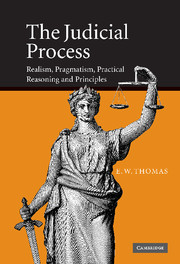Book contents
- Frontmatter
- Contents
- Preface
- 1 Introduction
- 2 Muddling along
- 3 The ‘curse’ of formalism
- 4 Legal fundamentalism
- 5 The idolatry of certainty
- 6 The piety of precedent
- 7 The foibles of precedent – a case study
- 8 There is no impersonal law
- 9 So, what is the law?
- 10 The constraints on the judiciary
- 11 Towards a new judicial methodology
- 12 Of realism and pragmatism
- 13 Of … practical reasoning and principles
- 14 Taking law seriously
- 15 A theory of ameliorative justice
- Subject index
- Authors index
12 - Of realism and pragmatism
Published online by Cambridge University Press: 15 July 2009
- Frontmatter
- Contents
- Preface
- 1 Introduction
- 2 Muddling along
- 3 The ‘curse’ of formalism
- 4 Legal fundamentalism
- 5 The idolatry of certainty
- 6 The piety of precedent
- 7 The foibles of precedent – a case study
- 8 There is no impersonal law
- 9 So, what is the law?
- 10 The constraints on the judiciary
- 11 Towards a new judicial methodology
- 12 Of realism and pragmatism
- 13 Of … practical reasoning and principles
- 14 Taking law seriously
- 15 A theory of ameliorative justice
- Subject index
- Authors index
Summary
Hard realism
A new realism
In arguing that judges should adopt a hard realistic approach to judging, I am not advocating a return to the realism of the American Legal Realist movement. But I make that disclaimer without wishing to derogate from the constitutive impact of that movement on jurisprudential theory. A burst of realism was necessary then, just as another injection of more refined realism is necessary now. American legal realism was, in short, very much an insurrection against formalism; the pedantry and artificiality of legal reasoning; the myth of certainty in the law; and the dominance of rules in the legal process. It represented a shift of emphasis from what law is to what law does. In that respect, its success cannot be denied, but the success was partial and erosive. A further revolt in the nature of an insurrection may be more than what is required now, but open and organised judicial protest at formalism's lingering influence is very much in order.
The problem with American legal realism is that it sought to achieve too much. It was believed that it was not enough to expose the excesses and fancies of formalistic thinking. Both realists and their critics looked for a theory to replace that which had been systematically destroyed. Realists responded with a predictive science of law owing much to the experimental methods of the social sciences. Social scientific methods and insights could be employed to understand social change.
- Type
- Chapter
- Information
- The Judicial ProcessRealism, Pragmatism, Practical Reasoning and Principles, pp. 302 - 315Publisher: Cambridge University PressPrint publication year: 2005

